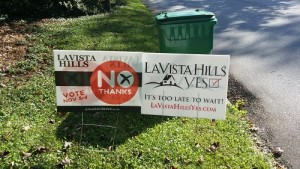LaVista Hills Feasibility Study Assumes Prohibited Tax Rate
 (APN) DEKALB COUNTY — The battle of yard signs and opinions in the proposed city of LaVista Hills show a divided community with some residents supportive and others opposed.
(APN) DEKALB COUNTY — The battle of yard signs and opinions in the proposed city of LaVista Hills show a divided community with some residents supportive and others opposed.
Boundary disputes have plagued the proposed LaVista Hills in the past.
Now a new controversy swirls around the University of Georgia’s Carl Vinson Institute (CVI) feasibility study that found the proposed City of LaVista Hills to be fiscally feasible.
The CVI study used the DeKalb County millage of 7.64 and thus ignored the 5.00 capped millage rate for LaVista Hills that was established in HB 520, the act which allowed the referendum on cityhood.
http://www.legis.ga.gov/legislation/en-US/Display/20152016/HB/520
“The millage rate imposed for ad valorem taxes on real property shall not exceed 5.00 unless a higher limit is recommended by resolution of the city council and approved by a majority vote of the qualified voters of the City of LaVista Hills voting on the issue in a referendum,” HB 520 states, on page 7, lines 221 through 223.
Russell Carleton, a researcher and statistician, made claims in the Atlanta Journal-Constitution that if the CVI study had used the legally required tax rate capped at 5.00, the results would show a deficit of about 114,000 dollars for the proposed city of LaVista Hills.
CVI actually used DeKalb County’s 7.64 millage rate and that result showed a 1.7 million dollar surplus for the proposed city.
“The CVI report is simply duplicating the tax structure of DeKalb County. It becomes an open question as to how much the city [LaVista Hills] really could raise,” Carleton told APN.
“I do not see how the two can be reconciled and the report considered valid,” Carleton told APN.
“When this opponent of cityhood [Carleton] first raised this issue, we went back to CVI and they assured us that he was misinterpreting the law in Georgia. They stood by their prediction that we are a viable city and we trust their analysis,” Allen Venet with LaVista Hills Yes, told APN.
Tucker is not having the same problem with their CVI feasibility study because they used a lower property tax rate than the maximum 5.00 approved by state lawmakers.
“What you pay in taxes is determined on how expensive government is and as government grows, your taxes go up. Maybe they don’t get it out of your property tax but they will get it some way. Maybe putting police on the street to write tickets, instead of doing public safety, which is something we all know happens in cities,” Marjorie Hall Snook, board member with DeKalb Strong, told APN.
Proponents of cityhood have been rushing to grab commercial property for new cities. They also have been pointing to issues of corruption and poor representation in DeKalb County Government.
The only thing for certain is that additional layers of government and politicians will not guarantee not having more corruption and cronyism in the new governments. This will not fix the County’s problems, nor will moving tax revenue out of the County to pay for new cities.
If passed, LaVista Hills will suck approximately eleven million dollars out of the County annually, but the County will still provide most of the services.
Some of the services the county will continue to provide are schools, sanitation, water, sewer, fire/EMS, libraries, courts, jails, animal shelters, family and children’s services, and more.
The services LaVista Hills will take on are police, parks, zoning, code enforcement, and roads.
Having their own police department is a main concern for proponents of the proposed city, where fear of crime is often expressed publicly.
LaVista Hills plans to have a police department staffed with 104 police officers for the 67,466 residents. They will still have to get other police resources from the County like K-9’s, bomb squads, SWAT services, domestic violence specialists, and helicopters.
Tucker does not plan to have a police department and finds no problems with the current County police service.
Tucker plans to provide basic services of planning, zoning, code enforcement, and parks and recreation. They will take about two million dollars out of the county, according to the DeKalb Commission quarterly financial report.
The demographics of LaVista Hills is 64.4 percent White, 16.9 percent Black, 15.8 percent Hispanic, and 8.7 percent Asian according to the CVI study.
So it will be another affluent, majority White city with a majority White government with their own police force.
People living within the boundaries of the proposed cities of LaVista Hills and Tucker will have a chance to vote yes or no for cityhood in two referenda on November 03, 2015.
(END/2015)